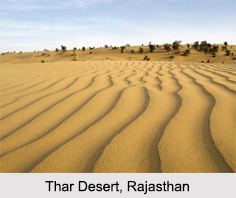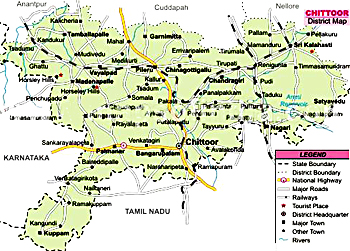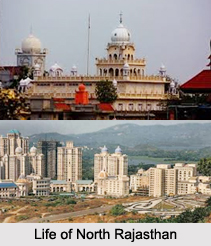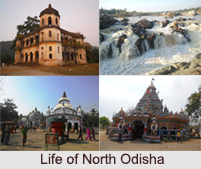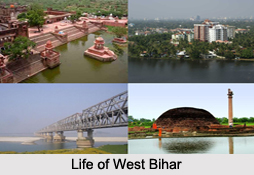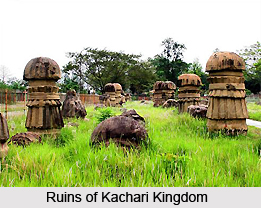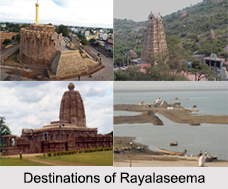About Kuki Tribes
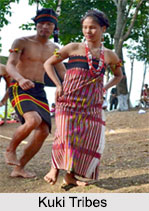 Kuki Tribes of Manipur are an ethnic group which spread over the vast areas of North eastern regions of India, North western regions of Burma and the foot hills of Chittagong Hill tracts. It is one of the largest tribal communities which have spread all over North East India as well as the countries who share a common border with Indian States. In India, the Kuki tribes are mainly found in the areas of Manipur, Nagaland, Mizoram and Assam.
Kuki Tribes of Manipur are an ethnic group which spread over the vast areas of North eastern regions of India, North western regions of Burma and the foot hills of Chittagong Hill tracts. It is one of the largest tribal communities which have spread all over North East India as well as the countries who share a common border with Indian States. In India, the Kuki tribes are mainly found in the areas of Manipur, Nagaland, Mizoram and Assam.
The expansion of this group is largely due to the British policy in India which included many more tribal groups and called them the Kuki tribes. The Kuki tribes are distinctly marked for their lifestyle which includes their economic, political, social and religious structure, along with spread of Christianity. Various changes have been initiated by the government for the upliftment of these tribal groups.
Origin of Kuki Tribes
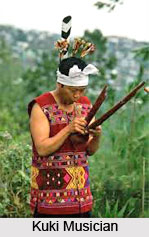 Origin of Kuki tribes is steeped in myths and legends of the country. The community first came into prominence with the writings of Rawlins on the tribes of Chittagong hills. As the Kuki tribes are one of the oldest settlers of the region, it carries number of stories which are sometimes historically proved while sometimes exist with the folklores of the area. Overall the study of Kuki tribes which has originated somewhere near 500 BC may include its inception in the pre historic and ancient days, its existence during the British rule and its present position which has faced lots of challenges from modernisation along with the method of migration which is one of the most vital part of Kuki tribe in India and its present location.
Origin of Kuki tribes is steeped in myths and legends of the country. The community first came into prominence with the writings of Rawlins on the tribes of Chittagong hills. As the Kuki tribes are one of the oldest settlers of the region, it carries number of stories which are sometimes historically proved while sometimes exist with the folklores of the area. Overall the study of Kuki tribes which has originated somewhere near 500 BC may include its inception in the pre historic and ancient days, its existence during the British rule and its present position which has faced lots of challenges from modernisation along with the method of migration which is one of the most vital part of Kuki tribe in India and its present location.
Kuki tribes are mainly found in the hilly regions of Manipur. This tribal group of North east India travelled a long way till it reached the present day. While the origin of this tribe is largely found in the mythological stories that prevails in the hilly regions of the land is sometimes proved historically while remains unproved in many areas. The story that narrates the origin of the tribe largely revolves round Noimangpa and Chongthu, the earliest fathers of the community; the great cave of Khul; Gulheipi the great snake and Lhaw, the lion which has been mentioned in the writings of a number of scholars and the mythological texts of the area. While the Kuki tribes are treated to be the aboriginal who settled in the hilly regions of Manipur, they bear a close resemblance with the physical features of Mongoloids and carry the linguistic traditions of Tibeto - Burmese traditions. These tribes since Ancient times played a major role during the British rule.
Origin of Kuki tribes can be traced into the number of tribal groups like the Aimol, Anal, Baite, Biate, Bawn, Changsan, Chiru, Chongloi, Chothe, Darlawng, Doungel, Guite, Halam, Haokip, Haolai, Hangsing, Hauzel, Hmar, Hrangkhawl, Kilong, Kipgen, Koireng, Khelma, Sakachep, Kolhen, Kom, Lamkang, Lenthang, Lhanghal, Hanghal, Lhouvum, Lhungdim, Lunkim, Lupho, Milhiem, Lupheng, Thangeo, Lhangum, Maring, Mate, Misao, Monsang, Moyon, Paite, Purum, Simte, Singsit, Singson, Sitlhou, Tarao, Tuboi, Tonsing, Touthang, Vaiphei, Vaulnam, Zou. The Kuki tribes are distinctively marked for their chieftain culture which represents a major trend of social trend of the community.
Thus origin of Kuki tribes establishes the tribal group as one of the most powerful group of Manipur which largely settled in the Hilly regions of the State.
History of Kuki Tribes
Ancient History of Kuki Tribes
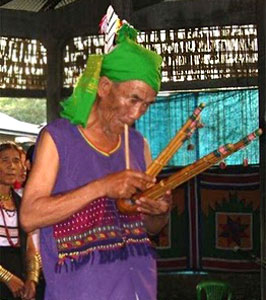 Ancient History of Kuki Tribes is reflected in two ways. While the origin of the tribe has been largely discussed within the legendary stories of the land; the historical presents of the tribal community is verified with the excavations made by a number of historians who locate the tribe since the stone age or Neolithic age that rounds up to 10,000BC and before. This tribe along with local dialects have been also mentioned in the Great epics of Mahabharata which marks its presence in the ancient India.
Ancient History of Kuki Tribes is reflected in two ways. While the origin of the tribe has been largely discussed within the legendary stories of the land; the historical presents of the tribal community is verified with the excavations made by a number of historians who locate the tribe since the stone age or Neolithic age that rounds up to 10,000BC and before. This tribe along with local dialects have been also mentioned in the Great epics of Mahabharata which marks its presence in the ancient India.
Ancient History of Kuki Tribes marked its presence in Indian subcontinent somewhere nearly 500 century BC which has been mentioned in the early texts of Ancient India. Much has been described in the ancient texts of Vedas and great epic of Mahabharata which can be regarded as authentic source of history. Along with this reference of Kuki tribes can also be traced in the local legendary stories which describe their migration and creation of a new community called the Kuki tribes. The origin of Kuki tribes has been largely located in the legendary chronicle of the land which takes the community back to the times of Noimangpa and Chongthu, the earliest fathers of the community and the legendary story that revolves around the great cave of Khul; Gulheipi the great snake and Lhaw, the lion which has been mentioned and accepted by a number of Scholars. However there has been some variations regarding their original; settlement. While some believe that the tribe made a south westerly migration to the sub Himalayan regions of north-eastern India and north- western Myanmar. At present the Kuki tribes are scattered in other parts of north eastern Indian States. Overall the historians mainly trace the location of the kuki Tribes in Ancient India through the excavation of various regions. The excavations predict that the tribe must have travelled from the south-eastern tracts to this region with a typical culture of carrying `T` shaped polished celt used as an axe or spade used for cultivating land or felling trees. Then they moved towards south westerly direction which is towards present day West Bengal- Orissa border carrying trends of Austric culture which later on formed the base of Indian culture and civilisation based on assimilation and blending.
Ancient History of Kuki Tribes along with this can also be traced within the writings of Vedas and Great epic of Mahabharata which are the earliest written texts of ancient India. Within Mahabharata the region along with its tribe was largely referred through Chittrangda who was the Nag daughter of the tribal king of Manipur- Ulupi and Kirata. This reflects the Indianisation of the subcontinent which was received with a lot of grace. The existence of these tribes during ancient days explains the presence of Hinduism in the state which has travelled from ancient days of Indian History. After this the tribe played a major role during the British rule in India which not only affected the culture of Kuki tribes but also their religion. The advent of British rule brought Christianity in the region which reformed some of the superstitions of the tribe. The tribe which is predominantly followers of superstitious black magic and local rituals got some reformations with the new religion.
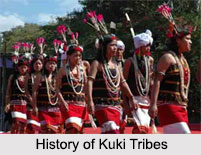 History of Kuki Tribes in Modern India
History of Kuki Tribes in Modern India
History of Kuki tribes in Modern India can be largely traced in the hilly regions of Manipur. Kuki tribes also played a significant role during the British colonial rule. During the British period, the Kuki chiefs were able to establish themselves on the vast hilly regions of North east. Under the leadership of Thadou Kuki Chiefs, the tribe could establish itself as the supreme tribal power of the area. The hills of Manipur were under the control of these tribes till they were subjugated and controlled by the British in the 18th and 19th century after the Anglo-Kuki War that took place between 1917 and 1919. The most important effect of this war was not only permanent subjugation of the Kuki tribes but also demarcating the borders of Manipur which still exists. Since 1919, the British established their control over the hilly regions of Manipur which helped them to establish direct administration in the region. With the establishment of sub-divisional oil ices in Tamenglong, Ukhrul and Churachandpur; the British slowly and gradually brought modernisation that penetrated in the primitive tribes of Kuki tribes.
Though predominantly occupants of Manipur, this tribe has also scattered in other regions of North East India. The group of Kuki tribes along with Manipur are also found in the North eastern states of Nagaland, Assam, Meghalaya, Tripura, Mizoram except Arunachal Pradesh The community has been successful in securing its culture and traditions well within their tribal society which is largely visible in their customs and traditions.
Society of Kuki Tribes
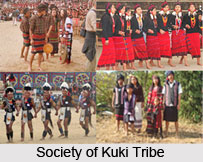 Society of Kuki Tribe has been formed within a number of relationships formed among the Tuchas, Songaos and the Bechas- the three sections of Kuki society. Society of Kuki tribes which is found in Manipur not only discuses the interrelationship within these three groups but also the customs which are shared by these groups which are largely visible in the customs like sharing of meat, the types of family structure that prevails within the tribe and the marital relationship that takes place within these three groups. The society of Kuki tribes revolves around the socio- economic, political and religious spheres of life which provides them with different sets of relatives. While the tribe is mainly guided by the basic etiquettes which reflect the institutional mechanism of social control, it, at the same time, provides the structure of the society which cannot be deviated.
Society of Kuki Tribe has been formed within a number of relationships formed among the Tuchas, Songaos and the Bechas- the three sections of Kuki society. Society of Kuki tribes which is found in Manipur not only discuses the interrelationship within these three groups but also the customs which are shared by these groups which are largely visible in the customs like sharing of meat, the types of family structure that prevails within the tribe and the marital relationship that takes place within these three groups. The society of Kuki tribes revolves around the socio- economic, political and religious spheres of life which provides them with different sets of relatives. While the tribe is mainly guided by the basic etiquettes which reflect the institutional mechanism of social control, it, at the same time, provides the structure of the society which cannot be deviated.
Society of Kuki Tribe begins when an Ego (groom) marries; he owns a number of relationships on his in law side. An ego`s children automatically become Tuchas to his wife`s parents, his brothers and brother`s sons. Likewise the in-laws of a Tucha become Songgao relatives of the latter. In other words every man in Kuki tribe turns to be both a Tucha as well as Songgao with two sets of relationships one set being that of his mother, wife and daughter- in-law`s kin group while the other set includes his own aunt, sister and daughtewr which he receives on return of every marital relationship. This forms the basis of Tucha Songgao relation ship which is the most important part of Kuki society. The relatives of the Tucha not necessarily reside in close by areas but the ego is free to select any one from both the sides of relationship who can represent the entire relationship at the time of need.
Society of Kuki Tribe includes the social institutions which can be largely categorised within two types. These relationships either depend on the marital relationship or on the economic grounds which are visible in the Parento-clientele relationship. More specifically when the Tucha-Songgao relationship is primarily based on the marital relationship that bears blood relations, the Parento-clientele relationship is largely dependent on the economic considerations. While the Tucha-Songgao is based on economic considerations that are community oriented and so not restrict itself with individual profit, the Parento - clientele relationship on the other hand depends on the individual profit which is totally economically oriented.
Society of Kuki Tribe along with these two relationships involves another relationship that is known as Bechas. The Becha relatives are those set of relationship which the ego inherits from nature in the form of his relatives. These Becha relatives hold a significant position in the Kuki tribe as they are the spokesmen of the ego and hold all powers to control the Ego. These groups of relatives stand in contrast with Tuchas and Songgaos which the Ego gains from marital relation. The entire social relationship of the Kuki tribe revolves round these three sets of relationship which forms the basis of the marital relationship of the Kuki tribes.
Society of Kuki Tribe along with the recognition of a number of social relationships also includes a number of formalities which involves the traditions like distribution of meat. The kuki tribe involves a ritual of sharing the meat which is usually distributed within the Tucchas and the Bechachas who share the upper and lower part of the animal meat. The custom of sharing of meat involves a major part of the social, economic, political, and religious life of the Kuki tribes which is considered to be one of the most important aspects of Kuki tribes. Along with this the Society of Kuki tribe ha a separate social structure with different types of family. While the tribe largely resides within eight types of villages, they include four type of families which are categorised as very small family with three members only; medium size family with four to six members; large size families with at least seven to nine members and very large size families with more than ten members. All these families revolve round the Tuccha - Songao relationship.
Administration of Kuki Tribes
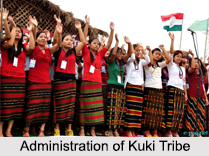 Administration of Kuki Tribes which is seen in Manipur is primarily based on the primitive structure of tribal community which largely depends on a responsible chief for its administration. The villages are the highest political unit of the kuki tribes which includes a Chief as the supreme authority of the village, Council of Ministers which functions within the territorial jurisdiction of the village, the village priest who is considered to be the last authority on religious terms, the blacksmith and the village labour corps. Overall the administration of Kuki tribe cannot be restricted to governance only; rather it includes all the political, religious, social and economic institutions which are the integral part of the Kuki administration.
Administration of Kuki Tribes which is seen in Manipur is primarily based on the primitive structure of tribal community which largely depends on a responsible chief for its administration. The villages are the highest political unit of the kuki tribes which includes a Chief as the supreme authority of the village, Council of Ministers which functions within the territorial jurisdiction of the village, the village priest who is considered to be the last authority on religious terms, the blacksmith and the village labour corps. Overall the administration of Kuki tribe cannot be restricted to governance only; rather it includes all the political, religious, social and economic institutions which are the integral part of the Kuki administration.
Chieftains of the Administration of Kuki Tribes
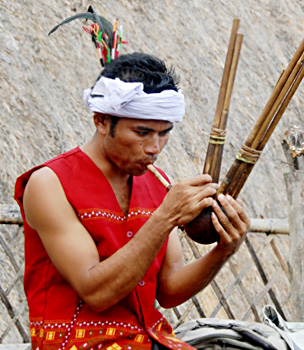 Chieftains in Kuki tribe begin with the Upa who is the senior most member of the community who is revered for the experience which he has gained all his lifetime. He is supposed to be the senior-most member of the entire tribe who is respected by all. The community of Kuki tribe largely depends on the Chieftains for running their administration. The Upa is then assisted by the Naopa who is the next in seniority but definitely younger to the Upa both in age as well as experience. The Naopa in normal course cannot take over the administration and has to seek full consent of the Upa and if the Upa allows he shall run the administration of the village with the assistance of the Council of Ministers. In spite of getting the consent of the Upa, the Naopa is entitled to perform certain formalities as well as obligation that are to go within its normal course. The administration of Kuki tribe then includes the council of Ministers form the third level within the village administration.
Chieftains in Kuki tribe begin with the Upa who is the senior most member of the community who is revered for the experience which he has gained all his lifetime. He is supposed to be the senior-most member of the entire tribe who is respected by all. The community of Kuki tribe largely depends on the Chieftains for running their administration. The Upa is then assisted by the Naopa who is the next in seniority but definitely younger to the Upa both in age as well as experience. The Naopa in normal course cannot take over the administration and has to seek full consent of the Upa and if the Upa allows he shall run the administration of the village with the assistance of the Council of Ministers. In spite of getting the consent of the Upa, the Naopa is entitled to perform certain formalities as well as obligation that are to go within its normal course. The administration of Kuki tribe then includes the council of Ministers form the third level within the village administration.
Chieftains in Kuki tribe are one of the perennial sources of all the customary laws which exist in the village. They are entrusted with all the rights and privileges that are institutionalised within the village community. As such the Upa and the Naopa who function as the chief of the village community are supposed to be responsible for all the social customs and functioning. It is only with their permission that the customs shall be followed in the land. Further the Institution of chieftainship which prevails in the Kuki tribe exhibit a high level of leadership which keeps the entire society together.
Chieftains in Kuki tribe are largely visible in the village structures of the Kuki tribe. The community is divided within a number of villages, each one having a chief. As the villages are the largest unit of Kuki administration, the chiefs of the villages are supposed to look after the administration of Justice, enforcement of executive function, maintenance of social practices and customary law including religious performances. Chieftain of Kuki tribe runs his administration from the office of the chief which is popularly known as the Haosa . This office shall be responsible for allotting land to the tribesmen for cultivation. It is one of the most important offices within the Kuki tribe which runs the village administration along with all the customs and functions of the land. On return the village people too are supposed to pay some return to the chief for the services which are delivered by the chief for them. This is called `Changseo` which includes paying of some tribute after the harvest. This takes place annually.
Chieftains in Kuki tribe, along with the rights, also bear certain obligations towards the villagers. On return to the services rendered by the villagers, free of cost and the tribute paid by them as a token of loyalty, recognition, obedience and solidarity; the Haosa is supposed to protect them and their interest socially, politically and economically. It also includes the duty of the Haosa to see that the villagers are free from all external aggression and danger. Overall the office of the chieftain bears a lot of authority whbich makes him very similar Hobbes`s social contract theory. The office can be regarded as the soul authority of the village. Chieftains in kuki tribe is one of the integral part of kuki culture which not only provides security to the village community but also engages into the day to day administration of the village in which the Upa is assisted by his council of ministers. Notwithstanding its defects this is one such traditional institution of the Kuki tribes which has been able to maintain the culture of the village community that has been able the challenges of modernity.
Thus chieftainship of Kuki tribe is one of the most vital social structures which form the core of village community. It not only looks after the regular administration of the village but also takes care to maintain the economical, political and religious factors of the community along with the judiciary of the land.
Administration of Kuki tribes begins with village administration which is the highest unit of Kuki administration. It primarily follows the rules laid down by the "Upa". The basic administration in the village is run by the Upa, "Naopa" and the council of ministers. Along with these the administration, includes the structure of administration which surround the village. This includes the priest of the village, blacksmith and village corps.
Upa: The Upa is the senior most member of the village. He is considered to be the head of the village as he is the senior most member of the village. The chieftainship is largely conferred upon them as they are considered to be the most honoured member of the village with a lot of experience.
Naopa: Next to the Upa is the position of the Naopa who is younger than Upa. A Naopa can run the administration only with the full consent of the Upa. The Naopa shall take decisions only with the consultation of all the council of ministers that form the next strata of Village administration of Kuki tribes.
Council of Ministers: Council of Ministers of the Chief, are also known as `Semang-Upa` or `Pachong` collectively who shall be responsible for the daily administration of the village.
Thiempu: A Thiempu of the Kuki village is one of the most important people who shall be responsible for performing all social rituals in the village. He is considered with a lot of honour and reverence in the community.
Blacksmith: Along with him another important character of the Kuki society is the blacksmith who is responsible for manufacturing all the agricultural equipments which are usually made up of iron and requires the skill of the Blacksmith.
Lawm: The Kuki tribe then includes the village labour corps also known as Lawm. This groups mainly includes all those who are able to work and can be included into the work force of the tribe. This mainly considers the economic life of the Kuki tribe.
Activities of the Administration of Kuki Tribes
Administration of the Kuki tribes includes a number of activities which are based on community welfare. The administration of the Kuki tribes which is prevalent in the villages is based on division of labour. In this, people from all age groups are involved, like teenagers and even younger boys and girls, who are trained to work for their community. They form small units known as the "Lawmpi", which is further divided into Lawm-Lai, Lawm- Neo, Lawm-Changpah, which includes the young volunteers of the village.
Administration of Kuki tribes also includes the customs like Saleng (Semai), Salu (Head of the Killed Game), Changseo, Khuotha, Khuomuol, Khuojeh, Umnit and Khouthiensuo. These are largely oriented towards showing gratitude to the chief for the services he delivers for the tribesmen. The customs like Khouthiensuo is celebrated only once a year on the completion of the year with beating of drums. Similarly, Umnit means observance of confinement at home on a particular day which usually takes place when there are mishaps in the village.
Religion of Kuki Tribes
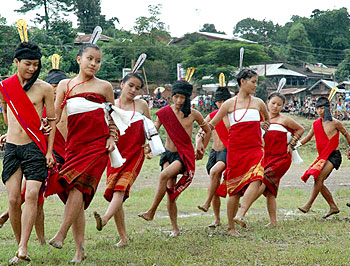 Religion of Kuki Tribes is one of the inevitable parts of the Kuki traditions which carry the cultural trend of its origin. As the tribe can be located back within the Tibeto- Burman group who bear some trends of Mongoloids this tribal group largely followed the religions which prevailed among these tribal races that travelled from Asian continent to India and got intermixed with the existing religions of India. Overall the Land of Manipur largely follows Hinduism and Sanamahi which are the age old religions of Manipur. This got some challenge from Christianity which came with the advent of British and formation of British Missionaries in Manipur. With the passage of time even Islam became an integral part of the religions of Manipur. While Meitei Pangal constitutes the Muslim population of Manipur residing within the valleys of Manipur, the Kukis and Nagas who reside in the hilly regions of the land are either followers of Christianity or local tribal religion.
Religion of Kuki Tribes is one of the inevitable parts of the Kuki traditions which carry the cultural trend of its origin. As the tribe can be located back within the Tibeto- Burman group who bear some trends of Mongoloids this tribal group largely followed the religions which prevailed among these tribal races that travelled from Asian continent to India and got intermixed with the existing religions of India. Overall the Land of Manipur largely follows Hinduism and Sanamahi which are the age old religions of Manipur. This got some challenge from Christianity which came with the advent of British and formation of British Missionaries in Manipur. With the passage of time even Islam became an integral part of the religions of Manipur. While Meitei Pangal constitutes the Muslim population of Manipur residing within the valleys of Manipur, the Kukis and Nagas who reside in the hilly regions of the land are either followers of Christianity or local tribal religion.
Religion of Kuki tribes revolves around mythology as well as the superstitions which are believed strongly by the people of Kuki tribes. These are the traditional rituals which contain their explanation in the folklores of the region and the translation which are available in various songs of the land. These normally include the rituals like Tuolsuo Rituals, Ankong-Tawl, Sa-Ai Ceremony, Chang-Ai Ceremony, Agricultural Rituals, Khuongchoi Ceremony, Indawi Deity Celebration. This tribe also follows the customs like child naming ceremony and funeral ceremonies along with a number of festivals like Sawm Kivah, Lawm-Siel-Kai, Puon Kaap, Sachan.
Customs of Kuki Tribe
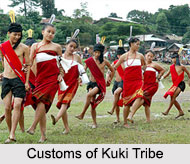 Customs of Kuki Tribe form an integral part of the Kuki society. It largely exhibits the social structure of the Kuki Tribe that resides in Manipur. Customs of Kuki tribe mainly include the ceremonies that begin with a "Child Birth" largely including the Naming ceremony of the child and the ceremony of christening the child which is known as Naopui Ceremony. The ceremony for naming the child and christening the child are normally demarcated as events post the birth of a child which are one of the most auspicious customs of the tribe.
Customs of Kuki Tribe form an integral part of the Kuki society. It largely exhibits the social structure of the Kuki Tribe that resides in Manipur. Customs of Kuki tribe mainly include the ceremonies that begin with a "Child Birth" largely including the Naming ceremony of the child and the ceremony of christening the child which is known as Naopui Ceremony. The ceremony for naming the child and christening the child are normally demarcated as events post the birth of a child which are one of the most auspicious customs of the tribe.
Child Birth Customs of Kuki Tribe
Customs of Kuki Tribe usually include the customs which are followed by the parents of a child who is newly born till he reaches an age of five. These are regarded as the prohibitive activities which are followed by both the father as well as the mother when they go out of the house. According to the customs, the mother is supposed to bid a farewell to the child requesting him or her to remain at home when she is in the field. Every time she is supposed to remain conscious regarding the presence of the child`s soul along with her wherever she goes and as such she is supposed to make a mention of this before and after all her activities so that she does not hurt the child in any way. Similarly, the father of the child too has to remain alert about the presence of the new member in the family whenever he along with his family leaves the household for visiting some other place. In that case the father is more conscious about the security of the child from all evil spirits and makes sure that the child is not left alone. This is mainly done by either applying charred coal or by applying ginger to save the child from all illness and ill feelings.
Child Naming Ceremony of Kuki Tribes
Child naming ceremony is one of the simplest ceremonies of the Kuki tribes that reflects the social structure along with the structural social relationship which a child inherits from his parents. This includes those social relations which are inherited through kinship as well as marriages. The system of naming a child has been one of the most permanent ceremonies that the community follows in spite of all the changes that came up along with modernisation.
Child naming ceremony claims that the first boy child of a generation should be named after the name of his grandfather and in case of first girl child; she should be named after her grandmother. In case of third and fourth children they can be named after the maternal grandparents or after some one who is very close to the family. The process of naming a child after his or her grandparents is considered to be the easiest and simplest method of locating the child and their origin as to from which family do they belong. As the name of the child carries the name of his earlier generation, this has been treated as the most accurate method for creating the genealogical tree that shall explain the actual location of the child in the Kuki family. As this is also known as Alternate Generation naming System. In this the Grand parents who share their names with the new generation are often known as `Hepu` or grand father or `Hepi` known as grand mother. Likewise the person whose name is shared with the child other than the grand parents is known as Katu meaning my grand child even if the relationship is different.
Child naming ceremony also provides that sometimes the child is sometimes named after the parental uncle and aunt instead of grand parents in order to show respect and love that shall help to establish better relationship between both the families. This also continues in case of the girl child who shares the name with the women members of the family. Overall the relationship between the grandparents and grand children is that of joking and friendship which is carried over by the sharing of names by both. Sometimes sharing of names also includes the names of the great- great grand parents or the progenitors where the effort is to gain some blessings from the fore fathers. This is mainly practiced to avoid the ill - luck in the family particularly ill- health which is treated as a curse.
Child naming ceremony which is prevalent in the Kuki tribes takes a lot of care in selecting the name of a boy child whenever a child is born after a number of sisters. Although the Kuki tribes treat their sons and daughters on equal terms yet on some exceptional cases their level of delight remain higher when a boy is born after a long interval or after a number of Sisters or a girl is born after a number of brothers. In that case unusual to the custom the girl child also carries the name of the grand father instead of grand mother.
Thus Child naming ceremony is one of the most important ceremonies which are followed by the Kuki tribes after the child is born which is treated as the most vital ceremony to recognise the origin of the child.
Naopui Ceremony of Kuki Tribes
Naopui Ceremony of Kuki Tribes is one of the vital social ceremonies of the Kuki tribe which is organised by the maternal uncle or the maternal grand parents. This ceremony assures the purity of the child before anybody causes him any harm. The Thiempu or the priest is supposed to organise the ritual which shall take place in the house of the maternal uncle or maternal grand parents. The ceremony begins with the cutting of a ginger into pieces which shall be used by the priest in due course. The child is carried by one of the Becha ladies who are supposed to be the purest and free from all physical blemishes and who possesses the normal method of marriage.
Naopui Ceremony of Kuki Tribes requires a number of articles which include the one jar of rice beer called Zubel; one cloth called `Puondum` which should be of black colour in the Thadou community with two white lines on the border , length wise while no other colour is allowed. With these articles the family members of the child the family members of the child should leave for the house of the maternal grand parents or the uncle along with all their Becha and Tuchcha relatives. On reaching the maternal grand parents house the maternal Uncle or the maternal grand parents of the child should declare the beginning of the ceremony by cutting a piece of Ginger into small pieces after which the priest shall perform the purification rites. It is only after the completion of the rites that everyone shall enter the house with the child who is now secured and purified. Once the initial purification is done, the Becha of the child`s family, raises and request for blessing the child. While doing so the becha relative hands over all the articles which were brought by them requesting the maternal relatives to bless their child. All the interaction takes place within the Bechas of both the sides. Once the parties settle down n then Zu is presented and all the relatives of both becha and Tucha sides are asked for the feast till the priests continue with rest of the rituals which is known as `Lha-Lhaw`.
As a part of the celebration a portion of meat is cooked and eaten while the rest of the portion of the dead animal which is called Sa - Hap that 9is either a part of a pig or a Mithun is given back to the parents of the child. After the priest is over with his rituals he then performs some rites which require a cock. After this is done only then the priest can take some beer which he sprays over the child finally bringing the ceremony to an end. The grandparents offer a pot of Zu along with one dead pig, and right hind leg of a killed animal which the Thiempu accepts when the family returns to their house. The cock plays a significant role in pacifying the omens. This finally brings the custom of christening the child comes to an end.
Naopui Ceremony of Kuki Tribes is one of the ceremonies which is performed with a lot of participation from both the Bechas an Tucha relatives. This is primarily aimed at securing the child from all omens while it paves the way for a better understanding between the two sides of relatives.
Thus, the customs of the Kuki tribe describe not only the social structure of the community but also the ceremonial life of the people. The customs of Kuki tribe reflects the core belief of the society.
Types of Families in Kuki Tribes
 Types of Families in Kuki Tribes, which reside in at least eight types of villages of Manipur, can be largely categorised into four types of family structures. The size of the families in the Kuki tribes varies from small families which include hardly three to four members; medium size families with four to six members; large size families with seven to nine members and very large families with more than ten members. Overall these families are categorised between the joint families which carries three to four generations and nuclear families which are the smallest unit of family within the Kuki tribe.
Types of Families in Kuki Tribes, which reside in at least eight types of villages of Manipur, can be largely categorised into four types of family structures. The size of the families in the Kuki tribes varies from small families which include hardly three to four members; medium size families with four to six members; large size families with seven to nine members and very large families with more than ten members. Overall these families are categorised between the joint families which carries three to four generations and nuclear families which are the smallest unit of family within the Kuki tribe.
Types of Families in Kuki Tribes begin with the family of the eldest son which is supposed to be the most permanent type of family. Within his family the elder son is supposed to live with his parents, grand parents, and unmarried brothers and unmarried sisters who are treated as the responsibility of the elder son. Essentially this family is the most permanent family structure within the Kuki tribes which carries at least three to four generations. The second type of family found within the Kuki tribe is the Nuclear family of the younger generation who are free to form a nuclear family till the younger generations get married. As such it has been mentioned that every family finally turns to be a joint family the moment its younger generations get married and the family expands. The third type of family which is mentioned within the Kuki tribes is the Earned joint family. This type of family includes those families which are said to be biological growth of the nuclear families which turned to be joint families with only one generation. Therefore it is said that the Kuki households are largely divided into two categories - the family of Upa which is the Inherent Permanent Joint Family and the second type known as the family of Naopa which basically includes the nuclear families that will turn to be Earned Joint Families with the next generations.
Types of Families in Kuki Tribes can be economically categorised between three groups which include the labour force. Among this the people who belong to the age group of 15 to 60 are included who possess the ability to work. The second category includes the non labour group which includes the group of people who are not supposed to work for economic gains; and the third category of working force includes those who are already absorbed in various professions and earn the livelihood for the family. Overall the families of the Kuki tribes revolve round the formalities of the Tuchas, Songgaos and Bechas which decides the kinship of the tribe.
Thus the types of families in the Kuki tribes which are found in various regions of Manipur bear separate characteristics. These are mainly based marital relationship which defines the basic structure of the society.
Rituals of Kuki Tribe
 Rituals of Kuki Tribe are important features which form an integral part of the Kuki society. Rituals of Kuki Tribe as such include the religious practices which have travelled from the past along with the prayers that are chanted by the priests of the tribe. The rituals of Kuki tribe are the pivots which express the influence of supernaturalism and mysticism. As the society is based on the traditional beliefs of the land, it includes a variety of myths and folklores which are chanted through prayers. However the ritual of Kuki tribe does not make a mention of any sacred placed which can be treated best for the rituals.
Rituals of Kuki Tribe are important features which form an integral part of the Kuki society. Rituals of Kuki Tribe as such include the religious practices which have travelled from the past along with the prayers that are chanted by the priests of the tribe. The rituals of Kuki tribe are the pivots which express the influence of supernaturalism and mysticism. As the society is based on the traditional beliefs of the land, it includes a variety of myths and folklores which are chanted through prayers. However the ritual of Kuki tribe does not make a mention of any sacred placed which can be treated best for the rituals.
Rituals of Kuki tribe highlight the significance of agriculture, as the society of Kuki tribes is predominantly agro based. Some of the rituals of Kuki tribe include Tuolsuo Rituals, Ankong-Tawl, Sa-Ai Ceremony, Chang-Ai Ceremony, Agricultural Rituals, Khuongchoi Ceremony and Indawi Deity Celebration. These rituals are primarily agro- based ceremonies of Kuki tribe.
Tuolsuo Rituals
Tuolsuo Ritual is an important ceremony of the Kuki tribe which is organised whenever a family in the tribe has produced successful crops of paddy for three consecutive years. In this, the credit goes to the women of the family who are primarily responsible for the success of agricultural produce. In this ceremony, the couple cannot perform the rituals unless they go through an elaborate process of purification and self restrain that is considered to be beneficial for agriculture. The process of self purification is reached through three levels which will finally make them eligible for the ceremony.
The ritual of Ankong-Tawl is the continuation of the same ritual which includes the third stage of the earlier ritual. In this, the child can accompany the parents but cannot share the same meal. This ritual denotes the food items which are to be included in the meal of the wife and her son.
Sa-Ai Ceremony
Sa-Ai ceremony is celebrated by such a male who has gone through the entire procedure of purification. It is a wild hunt game in which the male of the family informs all his Tucha and Becha relatives and takes the permission of the Chief along with the Thiempu and the Council of ministers about this wild hunt and performs rituals before he leaves.
Chang- Ai Ceremony
The festival of Chang-Ai Ceremony is aimed at celebrating the success of farming. This is done more or less privately and is only shared with the Becha relatives, the chief and the priest. This is performed with an intense purification process to pray to god for further success.
Khuongchoi Ceremony
The ceremony like Khuongchoi Ceremony is celebrated to challenge the evil spirits. The main participants are the young boys and girls of the Lawm who along with the Lawm perform the ritual.
Thus, the rituals of Kuki tribe are a combination of both faith and trust which exhibits the belief of the tribal people. As these are more or less agro-based it holds a lot of significance in the daily life of the people of Kuki tribes.
Marriages in Kuki Tribe
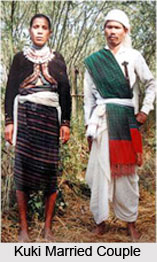 Marriages in Kuki Tribe are one of the most important social institutions which define the cultural trends of the Kuki tribe. A member of the Kuki tribe is free to select his life partner in three different ways. He can select his life partner either through arranged marriage which is popularly known as the mother`s brother`s daughters` marriage or MBD way of marriage. The arranged marriages often take place during the childhood of the boy and girl, when the parents of the boy are determined that the boy should marry no body else than mother`s brother`s daughter called Neinu. The marriage negotiations are supposed to be initiated by the parents of the boy and the girl during their childhood. The system of arranged marriage which is visible in the Kuki tribes also include some extreme instances when on the birth of a baby girl , her father`s sister and her husband initiate that she shall be the Nienu of their son then , she should not be given to any one else. As such the institution of arranged marriage describes those marriage proposals which are organised within the close relatives of the boy and girl in their childhood.
Marriages in Kuki Tribe are one of the most important social institutions which define the cultural trends of the Kuki tribe. A member of the Kuki tribe is free to select his life partner in three different ways. He can select his life partner either through arranged marriage which is popularly known as the mother`s brother`s daughters` marriage or MBD way of marriage. The arranged marriages often take place during the childhood of the boy and girl, when the parents of the boy are determined that the boy should marry no body else than mother`s brother`s daughter called Neinu. The marriage negotiations are supposed to be initiated by the parents of the boy and the girl during their childhood. The system of arranged marriage which is visible in the Kuki tribes also include some extreme instances when on the birth of a baby girl , her father`s sister and her husband initiate that she shall be the Nienu of their son then , she should not be given to any one else. As such the institution of arranged marriage describes those marriage proposals which are organised within the close relatives of the boy and girl in their childhood.
Marriages in Kuki Tribe also include the second type of marriage that takes place with the mutual consent of the boy and girl when they fall in love with each other. In this the boy and girl may fall in love and ask their parents to give their consent for organising their nuptials. This often results in the formal negotiations within the families of the boy and the girl. Commonly this is available within the mother`s brother`s daughter and father`s sister`s son.
The third type of marriage that takes place in the Kuki tribe is due to the elopement that is organised by the boy to get the girl he loves. This usually happens when a boy and a girl fall in love with each other and any one of the parents raise objection to their union then the couple is left with no alternative than elopement. It also involves such situations when a third person is likely to interfere as the third contender for the girl`s hand or when there is the economic considerations involved which shall decide the fate of the girl or when the girl is impregnated by her lover then the couple has no other alternative than getting eloped till they are engaged with marriage.
Marriages in Kuki Tribe usually follow the normal course of customary procedures in case of normal marriage proposals. In usual times the parents of the boy along with all their Tucha and Becha tribes lay the proposal if marriage after offering Zu to the girl`s family. The final decision depends on the Bechas of both sides who are the deciding factors of the community. Round about it takes a number of visits to formally negotiate the marriage during which the bride - price is also fixed. Finally the marriage takes place when the boy accepts the challenge and wins his girl through wrestling. Then their relationship is formally accepted through marriage.
Marriages in Kuki Tribe also lay down a separate procedure for the special marriages in which every girl is entitled to be married under the system called `Cbongmoo Hailam Domma Kipai`. In this the girl`s father is the sole authority to decide the future of the girl. Anyone who is interested in showing his love to the girl should maintain all levels of dignity and prestige and then propose the girl. After this the formal method of fixing the bride price shall take place and if the Father of the girl has no objection then the formal marriage shall take place.
Festivals of Kuki Tribe
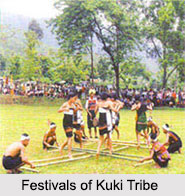 Festivals of Kuki Tribe are one of the most important aspects of the social life of the Kuki tribes. Festivals have been an integral part of the Indian culture that reflects the colours of the land. The festivals of the Kuki tribe mainly include Sawm Kivah, Lawm-Siel-Kai, Voicha Kih, Puon Kaap and Sachan. These are celebrated with the permission of the Tribal chief.
Festivals of Kuki Tribe are one of the most important aspects of the social life of the Kuki tribes. Festivals have been an integral part of the Indian culture that reflects the colours of the land. The festivals of the Kuki tribe mainly include Sawm Kivah, Lawm-Siel-Kai, Voicha Kih, Puon Kaap and Sachan. These are celebrated with the permission of the Tribal chief.
Sawm Kivah
Kuki Tribe introduced a celebration which is known as Sawm Kivah. In this the young boys from their childhood are allotted to different houses of the community which has a girl. These boys are supposed to protect the girl and her family and live so closely to the family that he can almost be recognised as one of the family members. This is mainly intended to help the family which does not have a son from any insecurity. The boys of Sawm shall help the girl`s family even during cultivation and at times of treat. Whenever the girl goes to attend a feast the Sawm boy is supposed to accompany her and take full care of her which is reciprocated by the girl as well. Sometimes this dependence becomes so permanent that the boy and the girl often fall in love with each other. This continues till the boy reaches the age and time comes when he is supposed to depart from the family. As a farewell to him the girl`s family then organises the Sawm Kivah. The celebration of Sawm Kivah also provides an opportunity to the parents of the girl in case they agree to the proposal. Then such consent is declared in the Sawm Kivah which means feast for the Sawm which shall be further celebrated with a jar of "Zu" or rice beer that is used at times of celebration.
Lawm-Siel-Kai
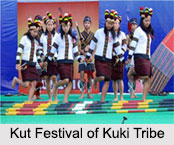 Festivals of Kuki Tribe include another unique festival which is known as Lawm-Siel-Kai. This is the festival which is celebrated by the young people when the seasonal work is over. In this the young boys put all their labour to fetch a Mithun for the Lawm festival. This festival is usually celebrated by all the members of the Lawm who approach the chief of the community and offer him a jar of "Zu" as a token for putting an application for the permission or approval for such a festival. The chief after verifying the economic condition of the village from the council of ministers gives his consent. The members of the Lawm then once again approach the chief to place a formal invitation for attending the feast which also includes the Thiempu, and other members of the Lawm. The festival largely centres on slaughtering a Mithun and distribution of the meat within the two parties of the Lawm. After this it includes the preparation of the grand feast which usually takes place at an evening of November which is selected by the chief.
Festivals of Kuki Tribe include another unique festival which is known as Lawm-Siel-Kai. This is the festival which is celebrated by the young people when the seasonal work is over. In this the young boys put all their labour to fetch a Mithun for the Lawm festival. This festival is usually celebrated by all the members of the Lawm who approach the chief of the community and offer him a jar of "Zu" as a token for putting an application for the permission or approval for such a festival. The chief after verifying the economic condition of the village from the council of ministers gives his consent. The members of the Lawm then once again approach the chief to place a formal invitation for attending the feast which also includes the Thiempu, and other members of the Lawm. The festival largely centres on slaughtering a Mithun and distribution of the meat within the two parties of the Lawm. After this it includes the preparation of the grand feast which usually takes place at an evening of November which is selected by the chief.
Voicha Kih
Voicha Kih is one of celebrations, aimed at breaking the monotonous life style of the Kuki tribal people. Voicha Kih is one such activity in which the Lawm members select one prosperous family and start working on his field. In this celebration, they give an indication that if the owner of the land wants his field to be cultivated by the Lawm members then he should organise a good midday meal for them.
Puon Kaap and Sachan
The Puon Kaap and Sachan are celebrated between the boys and girls of the tribe. In Puon Kaap the boys and girls begin to ridicule each other which end on violently challenging each other. Sachan on the other hand includes the celebration with distribution of the meat within the Tucchas and Bechas of a man.
Kut Festival
Mimkut is the harvest festival of the Kuki Tribe. They celebrate this festival on 17th of January every year. The celebration lasts one week. Besides Mimkut, Kuki tribes celebrate Chapphou Kuut, Chavang Kuut, as well as other smaller festivals.
Overall the festivals of the Kuki tribe mark the small and large celebrations that exist in the community. These can be considered to be the main source of refreshment for the people of the community who depend on these celebrations in a great way.
Textiles of Kuki Tribes of Manipur
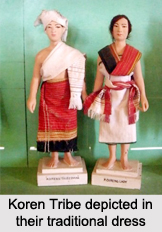 Amongst the old Kuki tribes of Manipur, Koren or Quoireng tribe lives close to the Maram Nagas of the state and a few other tribes of the old group. Their textile technology is identical to the Maram Nagas, with the influence of Angami designs and that of the Meitheis, along with the typical design of the old Kukis. Men wear the short black kilt that in custom of their neighbours, the Angamis, with whom they share trade relations. The petticoat of women is of various kinds. One which is popular is striped like the Meithei Phanek, but the border embroidery designs are akin to the Kukis. They are all woven at home.
Amongst the old Kuki tribes of Manipur, Koren or Quoireng tribe lives close to the Maram Nagas of the state and a few other tribes of the old group. Their textile technology is identical to the Maram Nagas, with the influence of Angami designs and that of the Meitheis, along with the typical design of the old Kukis. Men wear the short black kilt that in custom of their neighbours, the Angamis, with whom they share trade relations. The petticoat of women is of various kinds. One which is popular is striped like the Meithei Phanek, but the border embroidery designs are akin to the Kukis. They are all woven at home.
The Anal tribe, again a part of the old Kuki group of tribes, are found settled in the south-eastern part of Manipur. Though amongst the old Kukis, they consider themselves as one of the Naga tribes. Along with the Moyons, Monsangs, Koms etc., they call themselves the Pakan tribe. Culturally and linguistically, they are close to the Lushei-Kuki-Chin group of tribes though influence of the Naga culture cannot be ruled out completely. Due to long subjugation, there is also influence of the Meithei culture. The folk stories pertaining to their origin are identical to those of the Mizos and the Kukis. Their textile technology is basically similar to that of Nagas, Kukis as well as Mizos, who used to spin yarn from locally grown short staple cotton with drop spindle or spinning wheel, dye the yarn with locally available vegetable dyes and weave fabrics with Loins loom or Indonesian tension loom. Like their cousins, their technology has also undergone identical changes, discarding the traditional spinning and dyeing technology but continuing with the same old weaving technology using coloured mill yarns. Textile is totally the domain of women, who produce fabrics of different designs. The men usually wear a short resembling a lungi known as "Dil", covering the body from waist downwards. They use a simple shirt known as "Pakan Lungam". The normal attire of women is a skirt known as "Harsunhno" and a long shawl covering from the breasts to the knees known as "Lungwin" and a type of blouse known as "Lungam". Women at times wear a type of short skirt known as "Ahno" and a small cloth which covers their breasts known as "Khungam" or "Lungwin". 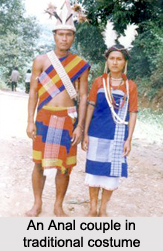 The other varied clothes include "Lukhun", "Javi", "Jathu", "Lukharg" etc. They are all known for their beautiful colour combinations and designs. Other tribes of the old Kuki group like Ainol, Maring, Moyon, Monsang, Chothe, Chiru etc., have dresses similar to the Kukis and the Mizos with influence of the Naga and the Meithei designs, being manufactured using the same weaving technology. The costume of the Maring tribe is too scanty.
The other varied clothes include "Lukhun", "Javi", "Jathu", "Lukharg" etc. They are all known for their beautiful colour combinations and designs. Other tribes of the old Kuki group like Ainol, Maring, Moyon, Monsang, Chothe, Chiru etc., have dresses similar to the Kukis and the Mizos with influence of the Naga and the Meithei designs, being manufactured using the same weaving technology. The costume of the Maring tribe is too scanty.
The new Kuki group of tribes such as Thadou, Gangte, Paite, Poi, Lushei and other Mizo tribes etc., are comparatively recent migrants to Manipur who are found settled mostly around Churachandpur and a few select hamlets almost all over the state. Next to Churachandpur, they are numerous in a portion of the Senapati district, around Sekmai, Motbung etc. It is reported that bulk of them migrated during the 19th century when Maharaja Nara Singh ruled Manipur and it was because of the initiative and planning by Col. W. McCulloch, the then Political Agent, that this group of tribes could be settled appropriately. Out of all these tribes, demographically Thadou is the largest. So far as their textile technology is concerned, it is identical to those of the Nagas and other Indo-Mongoloid tribes of the region. They too used to grow cotton of short staple length in their fields, sundry them after harvesting, gin them either by hand picking or by simple hand operated gins, convert them into sliver by rolling over a thin stick of grass, spin into yarn with the help of drop spindle or spinning wheel, dye the yarn with vegetable dye and finally weave beautiful fabrics with the help of back strap type loom or Loins loom. The changes that took place are also identical, with cessation of almost all preliminary operations but only weaving. They today weave their fabrics from the mill yarns of various colours with the help of Loins loom.
The Thadou men wear Loin cloth more or less identical to the dhoti of Bengal and Assam, and have one more cloth to wrap around themselves over one shoulder or both. They also wear as part of their attire, a Pugree or turban about a metre long or a little more. It is tied around the head with the ends or one end sticking up in the front. However, it has not been too long since the Thadou males went naked. Men are perhaps still found nude occasionally in the interiors, the Chin hills region, but the women always wore cloth. It was reported of even the old Kukis being seen naked in their houses in Cachar. The Thadou women wear a Loin cloth which is wrapped around their waist and reaches a little over half way down their thighs. Attached to the cloth, sometimes separately, is a string which is passed around the waist, holding the cloth up. 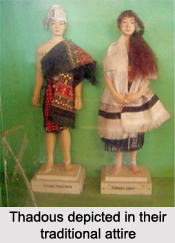 In addition they wear a breast cloth that is wrapped tight around their torso, the other corner being tucked in at the top at the spot between the left breast and the armpit. Sometimes an additional wrapper is thrown over the shoulders, completing their wardrobe. It may be noted that the Thadou women were careful about covering their breasts only until they gave birth, after which exposing them did not matter. The same tradition was observed with the Mizos as well.
In addition they wear a breast cloth that is wrapped tight around their torso, the other corner being tucked in at the top at the spot between the left breast and the armpit. Sometimes an additional wrapper is thrown over the shoulders, completing their wardrobe. It may be noted that the Thadou women were careful about covering their breasts only until they gave birth, after which exposing them did not matter. The same tradition was observed with the Mizos as well.
The Thadous settled around Churachandpur in Manipur had the tradition of producing woollen cloths. They got their wool from the sheep they reared. Both men and women use a kind of jumper, which is very crudely made, consisting of two strips of cloth measuring about 1.5 metres by 25 centimetres. These are stitched together leaving an unstitched gap to allow the head to go in. The sides of this chest and back protector are again stitched together leaving a gap in the centre of each for the arms. There is another coat shirt with short sleeves and a collar with a few buttons down the front, but that is certainly an imitation of the coat of Western countries. The wrappers or shawls used by men and women may be white or dark indigo blue. The white one usually has a black band at its extremes, while the blue ones have some embroidery work embellished in place of those bands. Traditionally, blue dye was obtained from the plant Strobilanthes flaceidifolious, which grew wild, although during this age of exploitation of dyeing technology, has been discarded and the weavers have started using coloured mill yarns in weaving their fabrics. The embroidered design is one of the most beautiful art works, rarely seen except amongst the Thadous, the Gangtes, the Mizos including Lusheis and the other new Kuki group of tribes. The design and colour combination of their fabrics are found to be more attractive than their cousins, the Nagas and the old Kuki group. One of the most prominent fabrics woven by the Mizo Kukis are termed as Puans, which are varied and vivid in design but more or less identical amongst almost all of the Mizo Kukis with minor local variations. The development of technology and design among the Mizos is gradual, thus a good lot of variation has been noticed.










